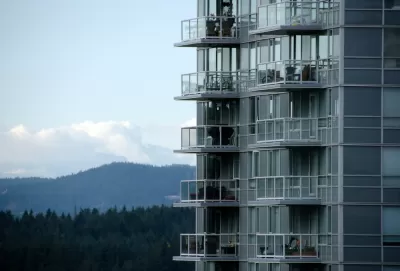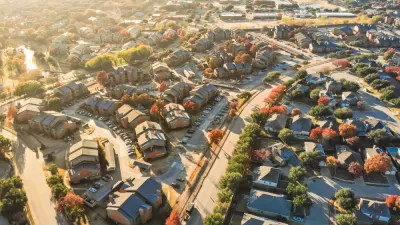Policies that encouraged urban segregation and led to the displacement and disenfranchisement of communities of color continue to reverberate in Canada's urban centers.

"In a 2012 report by the Canadian Centre for Policy Alternatives on municipal exclusion, author Ian Skelton noted that, 'the practice by municipalities of using controls on land use to constrain their social composition is a long standing one in Canada,'" reports Angela Wright in The Globe and Mail. In one example, Vancouver's Hogan's Alley, once a thriving Black community, "was demolished in the 1960s to make way for a municipal viaduct." Now, a group called the Hogan's Alley Society "wants to create a non-profit community land trust that would provide 70 per cent below-market rent and 30 per cent market rent with no private ownership."
Byron Nicholas, supervising transportation planner for Hudson, N.J., and creator of Black + Urban, "explains that when developers build luxury apartments with private amenities available only to residents, they are making decisions about who they want to make comfortable and provide services for and, by extension, who they care about." Privately owned public spaces have the potential to counter this exclusion, Wright says, "[b]ut to have this type of community-based planning approach, cities must address zoning bylaws." Zoning in Canadian cities, as elsewhere, "has been in the past used to control and segregate people," says Sandeep Agrawal of the School of Urban and Regional Planning at the University of Alberta. Now, cities like Edmonton, who Agrawal is working with, are taking a fresh look at their zoning codes "from equity and inclusivity lenses to make bylaws more reflective of contemporary urban realities."
"Inclusionary zoning that allows for supportive housing and mixed-use housing would go a long way to combat" the discrimination and marginalization created and perpetuated by racist zoning policies both past and present, says Agrawal. "Advocates say this can only be done with government investment in affordable and community housing." And while Canada's government supports community housing "through capital investments or loans," some activists say the programs are based on the "faulty notion that non-profit and community housing can be self-sustaining," advocating instead for ongoing housing subsidies and income supports.
FULL STORY: Yes, remnants of discriminatory urban planning remain

Alabama: Trump Terminates Settlements for Black Communities Harmed By Raw Sewage
Trump deemed the landmark civil rights agreement “illegal DEI and environmental justice policy.”

Study: Maui’s Plan to Convert Vacation Rentals to Long-Term Housing Could Cause Nearly $1 Billion Economic Loss
The plan would reduce visitor accommodation by 25% resulting in 1,900 jobs lost.

Why Should We Subsidize Public Transportation?
Many public transit agencies face financial stress due to rising costs, declining fare revenue, and declining subsidies. Transit advocates must provide a strong business case for increasing public transit funding.

Wind Energy on the Rise Despite Federal Policy Reversal
The Trump administration is revoking federal support for renewable energy, but demand for new projects continues unabated.

Passengers Flock to Caltrain After Electrification
The new electric trains are running faster and more reliably, leading to strong ridership growth on the Bay Area rail system.

Texas Churches Rally Behind ‘Yes in God’s Back Yard’ Legislation
Religious leaders want the state to reduce zoning regulations to streamline leasing church-owned land to housing developers.
Urban Design for Planners 1: Software Tools
This six-course series explores essential urban design concepts using open source software and equips planners with the tools they need to participate fully in the urban design process.
Planning for Universal Design
Learn the tools for implementing Universal Design in planning regulations.
Caltrans
Smith Gee Studio
Institute for Housing and Urban Development Studies (IHS)
City of Grandview
Harvard GSD Executive Education
Toledo-Lucas County Plan Commissions
Salt Lake City
NYU Wagner Graduate School of Public Service





























